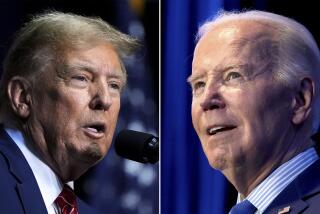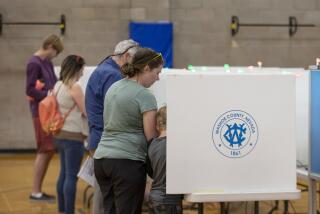Dole Wins Caucuses in Iowa; Buchanan Is a Strong Second
- Share via
DES MOINES — Sen. Bob Dole of Kansas won the Iowa precinct caucuses Monday, but it was Patrick J. Buchanan, by finishing a strong second, who got the biggest boost for his candidacy from this first major test in the Republican drive to regain the White House.
With 98% of the vote counted, this was the order of finish: Dole, 26%; Buchanan, 23%; former Tennessee Gov. Lamar Alexander, 18%; publishing magnate Steve Forbes, 10%; and Texas Sen. Phil Gramm, 9%.
Not only did Dole’s showing compare poorly to the 37% he received here in his 1988 quest for the nomination, but his narrow margin--by only three points--over Buchanan represented a dramatic comedown from the overwhelming lead the Senate majority leader had enjoyed in the polls. Once, Dole’s advantages here, in a state that neighbors his own, had suggested that Iowans would give him a victory that would ease his path to the nomination. Instead, they delivered a verdict that mostly raised more questions about his prospects.
While Buchanan gained the most by the night’s results, Alexander also kept his chances for the nomination alive by finishing third.
But Forbes, who for a time had dominated the race with his flat-tax proposal and his multimillion-dollar barrage of attack commercials, wound up a distant fourth. Forbes won just short of 10,000 votes for the more than $4 million he poured into this state--a $400 per ballot price tag that would daunt a less wealthy man. Forbes, however, has plenty more to spend and made clear he intends to do so as he looks ahead to next Tuesday’s contest in New Hampshire, where his prospects are more favorable.
Gramm, once considered the principal threat to Dole in Iowa and nationally, fell to fifth place following his surprising defeat last week at the hands of Buchanan in the Louisiana caucus. His campaign now is staggering--Republican cynics have taken to referring to him as “Dead Man Walking”--and he faces even more difficulty in New Hampshire, where he has weak support.
Far more was at stake in this contest than the fewer than 100,000 votes cast or Iowa’s meager portion of 25 delegates, little more than 1% of the total of 1,990 who will congregate at the party’s nominating convention in San Diego in August. Indeed, given the state’s elaborate selection procedures, the actual convention delegates will not be chosen for weeks. Based on the candidate’s order of finish in the night’s presidential preference ballot, the Associated Press projected the delegates will most likely be apportioned as follows: Dole, 8; Buchanan, 6; Alexander, 5; Forbes, 3; Gramm, 2.
But the real prize in the night’s voting was that most precious of political commodities, momentum, and it was that prize that Buchanan carried away to the next critical test in New Hampshire.
The results here assured a fierce four-way battle for votes in that contest. New Hampshire is the state that turned into a political graveyard for Dole’s presidential ambitions in 1988 when, after his victory here, he was ambushed by George Bush in the nation’s first primary.
Not surprisingly in a brief and low-keyed statement after the votes were in, Dole preferred to dwell on his success in surviving Forbes’ onslaught, rather than his showing against Buchanan. “We withstood a barrage of millions and millions of dollars of negative advertising and came out on top,” he told his cheering supporters, adding that his victory was “the first big step on the road to restoring conservative common sense to the White House.”
Buchanan, by contrast, was both ebullient and pugnacious as he declared his showing a “tremendous” victory.
With his wife, Shelly, by his side, Buchanan sent a greeting to his longtime cadre of supporters in the Granite State, where he gained 37% of the vote against Bush four years ago. “Keep the lamp lit tonight, friends,” the former Nixon and Reagan White House aide urged. “Shelly and I are coming home to New Hampshire.”
Though exit polls here indicated that Buchanan got much of his support from conservatives with strong views on such social issues as abortion, Buchanan sounded a broader appeal in his remarks here, stressing the economic nationalism and indictment of political corruption that have been key parts of his campaign message.
“We are taking back the destiny of our own country, we are going to restore the sovereignty of the American nation,” he said.
Making a direct pitch to supporters of Ross Perot, Buchanan declared that those “fed up with the corruption of big money in Washington, D.C.” should “join us” and “we will clean up the corruption and culture of bribery.”
While Buchanan described himself as “the only conservative who can win,” Alexander, argued that he was the virtual runner-up to Dole, since Buchanan, with his divisive views, could not be nominated. “I think Pat’s message is wrong for our party and wrong for our country and, therefore, he should not be the nominee,” Alexander declared.
Alexander, who apparently benefited here from his relatively bland style amid the antagonistic atmosphere created by the Forbes-Dole battle, looked past the New Hampshire primary. He said he hoped to do well enough in that state so that most people would conclude that “there are really only two [candidates] left who have the chance to be the Republican nominee. One is Sen. Dole and the other is Lamar Alexander.
As for Forbes, though he prided himself during the campaign on his non-political background, after the vote he displayed a politician’s gift for casting his performance in the best light.
“We have reshaped political life in America,” he declared. “We are now setting the agenda for this campaign.”
“I think we made a good showing tonight and we’ll do even better in New Hampshire,” he said. Indeed, Forbes might well do so. Unlike Iowa, where votes are cast in nighttime caucuses, putting a premium on long-nurtured organizations, New Hampshire is a primary more easily swayed by an expensive media campaign of the sort Forbes has waged. Moreover, religious conservatives, who play a major role here, and who soured rapidly on Forbes, are a far smaller part of New Hampshire’s electorate.
In the final hours of campaigning, the rival candidates played out the parts in this real-life political drama that they had scripted for themselves.
As behooves the front-runner, Dole sought to appear above the intraparty squabbling and to call attention instead to this fall’s battle against Clinton, who visited the state over the weekend and who won the state’s Democratic precinct caucuses Monday night without serious opposition.
Dole emphasized his usual themes of experience and leadership, and also poked fun at Forbes, blaming him for the negative tone of much of the campaign with his self-financed negative television and radio ads.
“We call him the Green candidate--he has a lot of it,” Dole said.
For his part, Forbes in a series of election morning radio broadcasts aimed at city commuters and farm workers driving long distances to jobs, mixed arguments for the flat tax with complaints that he had become the target of class-war attacks from his rivals.
“They’ve attacked me personally using the kind of language you expect from liberal Democrats,” he said on a WHO radio talk show.
Buchanan, meanwhile, sought to rebut arguments that he is too divisive a figure to unite the party and defeat Clinton in the fall. Indeed, in morning radio interviews, he argued that he is a stronger potential nominee because he, alone among the contenders, can win the votes of Perot backers.
Times staff writers Henry Chu, Nancy Hill-Holtzman, Stephen Braun and Maria L. La Ganga contributed to this story.
* SURPRISING SECOND: Up-in-the-air voters came down on side of Buchanan. A12
More to Read
Get the L.A. Times Politics newsletter
Deeply reported insights into legislation, politics and policy from Sacramento, Washington and beyond. In your inbox twice per week.
You may occasionally receive promotional content from the Los Angeles Times.









